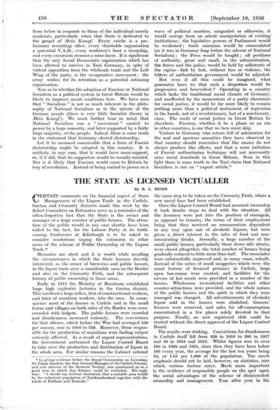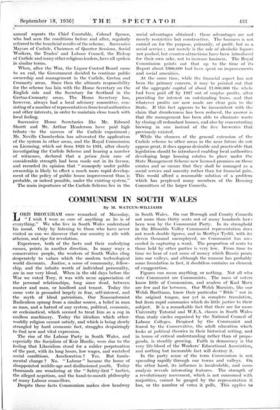THE STATE AS LICENSED VICTUALLER
By R. L. REISS
CERTAIN comments on the financial aspect of State Management of the Liquor Trade in the Carlisle, Gretna and Cromarty districts made this week by the Select Committee on Estimates serve as a reminder of the often-forgotten fact that the State is the owner and manager of a large number of public houses. The atten- tion of the public would in any case shortly have been called to the fact, for the Labour Party at its forth- coming Conference at Edinburgh is to be asked to consider resolutions urging the extension to other areas of the scheme of Public Ownership of the Liquor Trade.* Memories are short and it is worth while recalling the circumstances in which the State became directly interested, as the owner of breweries and public houses, in the liquor trade over a considerable area on the Border and also on the Cromarty Firth, and the subsequent history of public ownership in those areas.
Early in 1915 the Ministry of Munitions established large high explosive factories in the Gretna district. This involved a large influx, first of constructional workers, and later of munition workers, into the area. In conse- quence most of the houses in Carlisle and in the small towns and villages on both sides of the Border were over- crowded with lodgers. The public houses were crowded and drunkenness increased seriously. The convictions for that offence, which before the War had averaged 250 per annum, rose in 1916 to 950. Moreover, those respon- sible for the production of munitions were finding output seriously affected. As a result of urgent representations, the Government authorised the Liquor Control Board to take over the production and distribution Of liquor in the whole area. For similar reasons the Cabinet ordered
* In giving evidence before the Royal Commission on Licensing, Sir Edgar Sanders, the first General Manager of the Carlisle Scheme,- and now director of the Brewers' Society, was questioned as to a good area to which this Scheme could be extended. His reply was : " I should say without hesitation that a suitable area would be tho industrial population of Northumberland together with the whole of Durham and Teesside."
the same step to be taken on the Cromarty Firth, where a new naval base had been established.
Once the Liquor Control Board had assumed ownership it took drastic steps to deal with the situation. All the licensees were put into the position-of rnanageas, as opposed to tenants, the terms' of their employrnent being that they received no remuneration dependent in any way upon sale of alcoholic liquors, but 'were given a direct interest in the sales of food and non- intoxicating drinks. Secondly, a large number of the small public houses, particularly those down side streets, were closed altogether, the total number of houses being gradually reduced to little more than half. The remainder were substantially improved and, in many cases, rebuilt. Instead of the series of small snuggeries which were the usual feature of licensed premises in Carlisle, large open bar-rooms were created, and facilities for the service of hot meals were provided in a number of the houses. Wholesome recreational facilities and other counter-attractions were provided, and the whole nature of the public houses and the spirit in which they were managed was changed. All advertisements of alcoholic liquor sold in the houses were abolished. Grocers' licences were removed, and sales for off-consumption concentrated in a few places solely devoted to that purpose. Finally, no new registered club could be started without the direct approval of the Liquor Control Board.
The results were striking. Convictions for drunkenness in Carlisle itself fell from 950 in 1916 to 880 in 1917 and 80 in 1918 and 1919. Whilst figures rose to over 100 in 1920 and 1921, since then they have been below 100 every year, the average for the last ten years being 64, or 1.05 per 1,000 of the population. Too much emphasis should not be laid, however, on statistics, into which various factors enter. Much more important is the evidence of responsible people on the spot upon the social advantages of the scheme of disinterested ownership and management. Year after year in his annual reports the Chief Constable, Colonel Spence, who had seen the conditions before and after, regularly referred to the beneficial results of the scheme. Successive Mayors of Carlisle, Chairmen of Quarter Sessions, Social 'Workers, the Trades' and Labour Council, the Bishop of Carlisle and many other religious leaders, have all spoken in . n similar terms.
When, after the War, the Liquor Control Board came to an end, the Government decided to continue public ownership and management in the Carlisle, Gretna and Cromarty areas. Since then the ultimate responsibility for the scheme has lain with the Home Secretary on the English side and the Secretary for Scotland in the Gretna-Cromarty areas. The Home Secretary has, however, always had a local advisory committee, con- sisting of a number of representatives from local authorities and other interests, in order to maintain close touch with local feeling.
Successive Home Secretaries like Mr. Edward Shortt and Mr. Arthur Henderson have paid high tribute to the success of the Carlisle experiment ; Mr. Neville Chamberlain has advocated the application of the system in other areas, and the Royal Commission on Licensing, which sat from 1929 to 1931, after closely investigating the Carlisle Scheme and hearing a number of witnesses, declared that a pinta facie case of considerable strength had been made out in its favour, and recorded its opinion that " monopoly under public ownership is likely to effect a much more rapid develop- ment of the policy of public house improvement than is probable, or indeed possible, under the existing system."
The main importance of the Carlisle Scheme lies in the social advantages obtained ; these advantages are not merely restrictive but constructive. The business is not carried on for the purpose, primarily, of profit, but as a social service ; not merely is the sale of alcoholic liquors not pushed, but counter-attractions have been introduced for their own sake, not to increase business. The Royal Commission points out that up to the time of its Report about £300,000 had been spent on improvements and social amenities.
At the same time, while the financial aspect has not been the primary concern, it may be pointed out that of the aggregate capital of about £1,000,000 the whole had been paid off by 1927 out of surplus profits, after providing for interest on outstanding loans, and that whatever profits are now made are clear gain to the State. If this fact appears to be inconsistent with the claim that drunkenness has been reduced, the answer is that the management has been able to eliminate waste by closing all redundant houses, and also by concentrating brewing in one instead of the five breweries that previously existed.
While the chances of the general extension of the Carlisle scheme to other areas in the near future do not appear great, it does appear desirable and practicable that legislation should be introduced enabling local authorities developing large housing estates to place under the State Management Scheme new licensed premises on those estates and so ensure that they shall be managed as a. social service and amenity rather than for financial gain. This would afford a reasonable solution of a problem which has perplexed many members of the Housing Committees of the larger Councils.











































 Previous page
Previous page